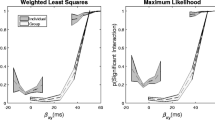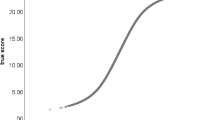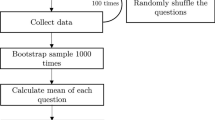Abstract
A split-ballot experiment shows that, when people are asked how interested they are in following political campaigns, their response depends not only on the order in which the question is asked, but also on the broader electoral context in which it is posed. When asked how interested they were in following the political campaigns immediatelyafter a question about whether or not they voted in the (1982) election, people were more likely to think they were interested in the campaign, especially if they claimed to have voted, than if they were asked about it immediatelybefore the question on whether or not they voted. This order effect, however, appears to depend onwhen the questions are asked. If asked within a few weeks after the election, there is little or no order effect. But later, as the memory of the campaign fades, the order of the questions makes a sizable difference in the results. This order effect also seems to be more pronounced among better-educated respondents, suggesting that they are more likely to feel pressured by a social norm to vote and to express an interest in political affairs, not only in “real life,” but in the survey interview as well. The paper concludes with a brief discussion of the implications for the design of the interview schedule used in the American National Election Studies.
Similar content being viewed by others
References
Bishop, George F., Robert W. Oldendick, and Alfred J. Tuchfarber (1982). “Political Information Processing: Question Order and Context Effects.”Political Behavior 4:177–200.
Campbell, Angus, Philip E. Converse, Warren E. Miller, and Donald E. Stokes (1960).The American Voter. New York: Wiley.
Center for Political Studies (1979).A Continuity Guide to the American National Election Surveys of the Center for Political Studies, 1952–1978. Ann Arbor: Institute for Social Research, University of Michigan.
Crespi, Irving, and Dwight Morris (1983, May). “Question Order Effects and the Measurement of Candidate Preference. In the 1982 Connecticut Elections.” Paper presented at the annual conference of the American Association for Public Opinion Research, Buck Hill Falls, PA.
Katosh, John P., and Michael W. Traugott (1981). “The Consequences of Validated and Self-Reported Voting Measures.”Public Opinion Quarterly 45:519–535.
Miller, Warren E., Arthur H. Miller, and Edward J. Schneider (1980).American National Election Studies Data Sourcebook, 1952–1978. Cambridge, MA: Harvard University Press.
Nie, Norman H. Sidney Verba, and John R. Petrocik (1979).The Changing American Voter. Cambridge: Harvard University Press.
Schuman, Howard, and Stanley Presser (1981).Questions and Answers in Attitude Surveys. New York: Academic Press.
Sigelman, Lee (1982). “The Nonvoting Voter in Voting Research.”American Journal of Political Science 26 (Feb.):47–56.
Author information
Authors and Affiliations
Additional information
The research reported in this paper was supported by a grant from the National Science Foundation (SES81-11404).
Rights and permissions
About this article
Cite this article
Bishop, G.F., Oldendick, R.W. & Tuchfarber, A.J. Interest in political campaigns: The influence of question order and electoral context. Polit Behav 6, 159–169 (1984). https://doi.org/10.1007/BF01207760
Issue Date:
DOI: https://doi.org/10.1007/BF01207760




